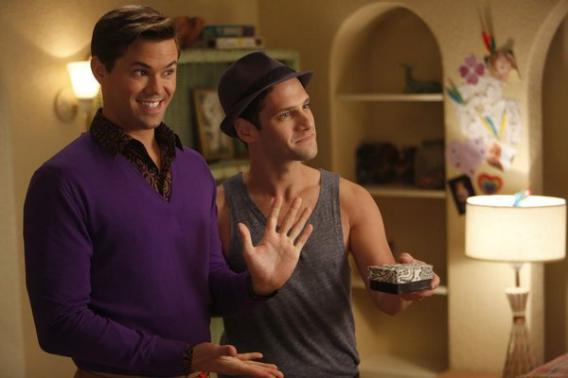The New Normal, NBC’s new Ryan Murphy-Ali Adler sitcom, has been reviewed as a dad comedy, a mean comedy, a show about changing families, and a gay show. In fact, it’s a program about being special.
The show’s setup—accomplished with astonishing haste in Monday’s pilot—is that David (Justin Bartha) and Bryan (the amazing Andrew Rannells), an affluent, gay couple, decide they’d like to have a child. After one brief misadventure, they find the perfect surrogate in Goldie (Georgia King), who has just reached Los Angeles after fleeing Ohio and her cheating husband, accompanied by Shania (Bebe Wood), her adorable daughter. Goldie’s decision to become a surrogate is motivated by money—she intends to use the $35,000 fee for law school—but she specifically wants to help a gay couple, because “a family is a family, and love is love.” Her own flesh and blood is decidedly less open-minded—the grandmother who raised her has zero tolerance for non-whites, non-Christians, gays, liberals, or women who don’t dress, look, and think exactly like her.
Nana, played by liberal firebrand Ellen Barkin, is such an extreme bigot you almost wonder if someone stole her script and substituted a few of Archie Bunker’s pages from 1971.* She spouts a kind of open hatred that isn’t heard in public anymore, as though the character has Tourette’s or watched so many episodes of Glee they forgot that Sue Sylvester would end up in jail or a shallow grave if she really said those things out loud.
In the second episode of The New Normal, which aired Tuesday, we learned that Shania is special. Her eccentricity first manifested itself when she started to dress and talk like Little Edie from Grey Gardens. Her mom didn’t understand why she suddenly had a strange Yankee accent and a cardigan on her head, and the kids at school were particularly unreceptive to Shania’s dead-on Edie-isms. But Bryan got it—and loved it— immediately. And, boy, could he relate. It was just like the time his doltish classmates destroyed the exact replica of the Carrington mansion from Dynasty that he had painstakingly created.
“My nana thinks I’m nuts, and my mom thinks I’m acting crazy because of all the changes going on,” Shania told Bryan when she realized that he “got” her. “But this has always just been me. Bryan, I’m a weirdo, and I don’t want to be. I just want to be normal.” Bryan couldn’t let that stand: “What a stupid, shortsighted wish. You don’t know this yet, but the most unique parts of you are also the ones that will lead to your greatness—and a chalet in Deer Valley with direct slope access.” It was a perfect moment of oddball bonding. In The New Normal, Bryan told Shania, “Us special people have got to stick together.” In another genre, someone would’ve yelled, “Avengers assemble!”
Of course, the world can be a cruel place. Most kids respond to specialness by upending the eccentric’s lunch tray or by trashing their scale-model soap-opera set. But as long as these lonely weirdos have someone to love and protect them—a sweet mom or a patient boyfriend—they can thrive. Nana, with all her bile and guile, is a warning of what can happen when wackos don’t find love: By the end of Episode 2, Bryan has recognized her creative genius. She is, it turns out, astonishingly inventive; her racist rants might be unoriginal, but she effortlessly Cyranos an irresistible speech for Goldie’s dopey estranged husband. Can she be persuaded to use her gifts for good? I hope the show will explore this some more.
In the meantime, I have some concerns. Murphy has a famously short attention span— Glee doesn’t have plot twists so much as extended bouts of amnesia—and the pace at which The New Normal has rushed from “here’s an idea, why don’t we have a baby?” to “she’s knocked up!” makes me worry that the just-conceived child will be graduating from high school by the end of Season 1. But perhaps that sped-up chronology is appropriate, since stories of special people finding one other usually involve mutants with superpowers and enemies with weapons stronger than hate speech.
Earlier, I denied that The New Normal is a gay show. I lied. It’s actually the gayest thing I’ve ever seen on network television. Created by an out gay man and an out lesbian mom, it speaks my language and parrots my paranoias. In fact, I’m almost convinced that some sections are broadcast on a frequency only Kinsey 6 homosexuals can hear. Although some of my fellow gays found Bryan and David too stereotypically butch and femme, to me they read as a loving, settled couple of a type that is so familiar, I’m sure I must have friends in common with Murphy and Adler. Nana’s homophobic comments—she describes a lesbian couple as a pair of “ugly men” and seems perpetually to be playing mad libs with the words fruit, candy, fudge, and packer—are exactly the kind of things I suspect straight people say about us when we’re not around. In Episode 2, when Bryan recalls a time before he and David “fully morphed into an old lesbian couple, minus the frowns and the gingerbread-man bodies,” it’s both funny—go on, I give you permission to laugh—and just what I imagine pretty, fit gay men say about their Sapphic sisters. It’s the type of joke you might hear in a lesbian comedy set—though the dynamic’s different there, because we’re in our own world. When the whole of America is listening, it’s tempting to deny the humor. But I admit it: I laughed.
*Correction, Sept. 12, 2012: This post originally referred to “Archie Bunker’s pages from 1968.” All in the Family didn’t debut until 1971.
